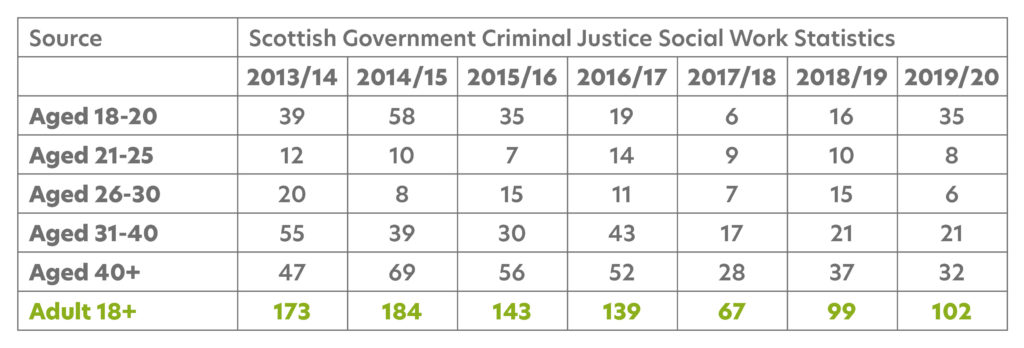Head of Service (Justice Services), Glasgow City Health & Social Care Partnership
In the 2019-20 Annual Reporter, in my article ‘A Plan to Improve Diversion from Prosecution (Adult)’ I provided information which outlined what Diversion from Prosecution (DfP) is; its importance as a tool for reducing the risk that someone committing lower level offences might re-offend; and its focus on dealing with the root cause of their offending behaviour. In essence, an earlier intervention that both puts the needs of the person at the centre and creates better efficiencies across the system with benefits felt by other partners upstream, for example, Court costs and churn.
I also outlined improvements that had been made for youth DfP and the learning that we had drawn from that and how we were using that learning to look at how we improved DfP for Adults coming into contact with the Criminal Justice system.
I am really pleased to report that work over 2020-21 has moved along at pace. The strong partnership around the Improvement Plan, fuelled by recognition of the system wide benefits of improving the number of referrals for DfP (Adult), have been the backbone of the progress made.
Over 2019-20, A Business Case was progressed with a focus on:
a.
b.
Increasing and maintaining increased referral numbers; and
Improving information flow between key agencies.
Figure 1 – Trends in Referral Numbers (18+ Adult)

The Business Care was developed on the understanding that:
- Adult DfP already has a core cohort of services established to address a range of needs, anecdotal information from the work already undertaken to improve referral rates, suggested that there is confidence in these services to deliver effective DfP work.
- Practitioner experience had noted that with the support and the valued commitment of the Head of Case Marking (COPFS), past initiatives, providing input from Criminal Justice Social Work staff to Training & Development sessions for Marking Staff had resulted in upward spikes in referral numbers in the short-term, however the benefit dropped off over time.
- Improved information/data sharing would support (ii) above and enhance understanding of the impact of DfP cases, allowing for more informed planning, use of resources and ability to manage spikes in referrals.
- The system savings would be spread across the justice system, and should not necessarily be seen as directly, nor locally cashable, however, as Community Justice Partners in Glasgow, our key priorities, as set out in the Community Justice Outcome Improvement Plan include:
- Service and Resource Alignment – We will use resources where they are most effective, and in a collaborative approach to improve outcomes.
- Prevention – We will continue with the development of earlier intervention and prevention within the Justice System, capitalising on opportunities at the first points of contact with Community Justice partners.
After consideration of several scenarios presented within the Business Case, the test of change agreed was for the Glasgow City Health & Social Care Partnership (GCHSCP) to allocate resource to co-locate a Criminal Justice Social Care Worker within Police Scotland’s Criminal Justice Team at London Road Police Station to improve information flow between Police Scotland (using the Standard Prosecution Report (SPR2)) and Crown Office and Procurator Fiscal Service (COPFS). With appropriate Police Reports being enhanced with contextual information about the individual. COPFS.
COPFS National Case Marking Manager was supportive of the approach noting that:
“A dedicated Criminal Justice Social Care worker at the Police Case Marking Hub would aspire to enhance the quality of Standard Police reports and compliment the information already provided by the Police in these. Such a resource would be able to access systems/signpost to services/arrange access to services for accused persons, all of which could be included in the SPR immediately and communicated directly with COPFS Case Markers. This kind of detailed information which could be included in the non-disclosable section of the SPR would be one of the key factors in the Crown’s decision making in the ultimate destination of the case. The aspiration would be to increase the Social Work diversion and ensure only the correct cases are put into court. This would aspire to save the public purse from any unnecessary prosecutions, protect the public and ultimately reduce reoffending.”
At time of writing plans to co-locate a Criminal Justice Social Care Worker are well progressed with practical arrangements in place for the post that was successfully interviewed and appointed. I look forward to providing an update next year on the impact of the post and the in-time evaluation work that will progress alongside the post – WATCH THIS SPACE!


